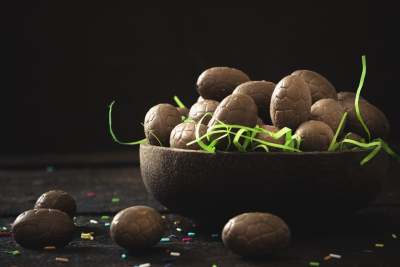Easter eggs, whether for children or adults, can be full of hidden surprises, as well as any treats inside them. And some of the surprises may not be so good. This includes child labour, poor workers' rights and palm oil.
In this guide we highlight some of the major issues associated with chocolate and thus Easter eggs to help you find the ethical alternatives to suit your budget and tastes.
(April 2025: We have removed Conscious Chocolate and Raw Chocolate Company from the guide as they have ceased trading.)
The cocoa crisis
Cocoa can only be grown in tropical countries, and it is almost entirely grown by smallholders. The bulk of production is in West Africa, with Ivory Coast – the biggest exporter - with Ghana is in second place.
But cocoa farmers receive barely any of the chocolate industry’s $100 billion revenue: estimates range between 6% and 11%. Up to 9 out of 10 Ghanaian and Ivory Coast cocoa farmers don’t earn a living income.
Moreover, cocoa farmers’ income is so low that it’s commonplace for them to rely on child labour. 4 in 10 cocoa-growing households in Ivory Coast are estimated to use child labour, and 6 in 10 in Ghana.
After cocoa beans are harvested (64% of the world’s beans are grown in Africa, 15% in South America and 13% in Asia), the majority are exported to international companies for the most profitable production stages: processing, packaging and retail. This means the profits are not felt in the country where the cocoa is grown.
What can consumers do about cocoa sourcing?
Buying Easter eggs from companies that are addressing child labour and wages for cocoa farmers is the most important things consumers can do.
That means only buying from companies that have good cocoa sourcing policies.
How do Easter egg brands score for their cocoa sourcing rating?
We considered a brand’s cocoa sourcing policy to be ‘adequate’ if 100% of their cocoa was:
- Certified by Rainforest Alliance or Fairtrade International
- Better than Fairtrade, including payment of at least the Fairtrade premium
- Value-added-at-source
The following were adequate and did not lose marks for this rating: Cocoa Loco, Divine, MonChoco, Moo Free, Ombar, Paccari, Tony's Chocolonely, The Real Easter Egg.
Brands that didn’t meet these criteria were considered to have an ‘inadequate’ cocoa sourcing policy and lost half a mark in the Workers’ Rights category. The majority of brands’ cocoa sourcing ratings were inadequate, including all the big well-known brands like Cadbury's and Nestle.
If you are wondering why Booja Booja scores highly in the table but is not one of our recommended brands, it's because its cocoa sourcing policy was rated as inadequate.
Value-added-at-source Easter eggs
Value-added-at-source (VAS) chocolate is chocolate that was manufactured in the same country that the cocoa beans were grown in, meaning more profits stay inside the cocoa-growing country.
Benefits of buying VAS chocolate
- Your money adds to the wealth of cocoa-growing countries.
- You’re directly helping micro companies and local job creation.
- You’re helping budding chocolatiers in cocoa-growing countries survive in this European-dominated industry.
- A shorter supply chain, making it easier to trace ingredients back to source and ensure workers’ rights are upheld.
You’re unlikely to see these brands at local stores (except for some local ethical stores): you’ll have to buy online and they’ll ship to you. Many are micro companies on different continents so customer service levels may vary, and we can’t vouch for the reliability of service you’ll get.
MonChoco is a vegan Ivory Coast chocolatier specialising in raw organic cocoa. Shipping chocolate worldwide is carbon-intensive, but its production emissions couldn’t be much lower: it literally crushes the cocoa beans ‘by bike’.
Paccari chocolate is made in Ecuador, allowing “50% of the wealth to stay in the country of origin and contribute to its development”. Its premium exceeds Fairtrade prices. It works with a UK distributor, so this is a great brand to encourage your local ethical store to get in stock (if it isn’t already).



